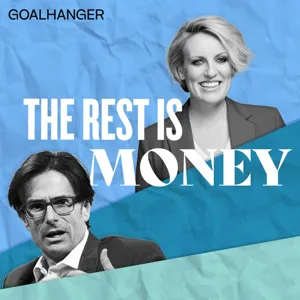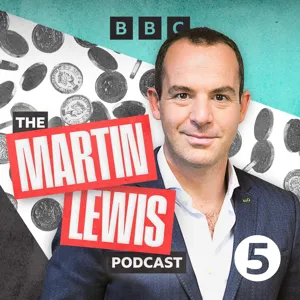Podcast Summary
Labour Party's Shadow Chancellor Seeks New Revenue Sources: Despite challenges in finding revenue to fund Labour Party's promises, Shadow Chancellor Rachel Reeves is determined to explore new sources, possibly from the private sector. The success of this approach remains uncertain.
Rachel Reeves, the Labour Party's Shadow Chancellor, is facing a significant challenge in finding revenue to fund her party's promises after the government spent money that was expected to come from abolished tax breaks for non-doms and extended windfall taxes on oil and gas companies. Reeves expressed her determination to find new sources of revenue, possibly from the private sector, but the success of this approach remains uncertain. The budget's impact on individuals and businesses is still being analyzed, and this episode highlighted some of the relevant implications. Shoppers, however, can always count on Kroger for affordable and inspiring mealtime options with over 30,000 choices and everyday low prices, as well as extra savings through digital coupons and fuel points.
New ISA incentive for UK listed companies: The British government introduces a new ISA, 'Great British ISA,' offering an extra £5 tax-free allowance for £5 investment in UK listed shares to boost retail investment and lower share prices for companies to expand.
The British government, through the chancellor, is trying to encourage more investment in UK listed companies by retail investors through a new ISA incentive. This ISA, named the "Great British ISA," offers an additional £5 tax-free allowance when £5 of the investment is in UK listed companies. The goal is to drive up the prices of these shares, making it cheaper for companies to issue new shares and expand. However, the effectiveness of this incentive for retail investors is questionable. British companies have relatively low valuations compared to their counterparts in other jurisdictions, which results in a higher cost of capital for these companies. This higher cost of capital makes it more expensive for them to invest in new projects and grow. The chancellor aims to address this issue by encouraging more retail investment, but it remains to be seen if this incentive will be enough to sway investors from foreign investments, which may offer better returns even after tax.
US stocks outperform UK stocks over last decade: Investing $5/yr in US tracker fund made £113k vs £67k in UK listed co's over last decade, due to institutional investors' decreased investment in UK shares.
The recent growth of tech giants like the Alphabets and Microsofts has significantly outperformed the UK stock market over the last decade, leading to higher returns for investors who have invested in US stocks over their British counterparts. For instance, an investor who put $5 a year into a US tracker fund would have made over £113,000, compared to £67,000 if the investment had been made in UK listed companies. This trend is not likely to change soon, as the majority of investment in the stock market comes from institutional investors, such as pension funds, which have significantly decreased their investment in UK shares over the last 20 years. The UK government's recent announcement of a £5,000 ISA top-up for retail investors is unlikely to change this trend on its own. To improve the performance of UK companies on the British stock market, the government needs to find ways to persuade pension funds to take bigger risks on British companies, which currently own a small fraction of their portfolios.
Encouraging pension funds to invest in UK companies: The UK government's plan to make pension funds disclose their investments may not be effective in attracting more investment to British companies due to pension funds' fiduciary duty to earn maximum returns. British companies should focus on improving productivity and performance to attract investment.
The UK government is considering making pension funds publicly disclose their investments in the UK and abroad, with the intention of encouraging more investment in British companies. However, the effectiveness of this approach is questionable, as pension funds have a fiduciary duty to earn the maximum returns for their savers. British companies need to improve productivity and performance to attract investment, rather than relying on shame or pressure from the government. Another issue discussed is the trend of companies choosing to list elsewhere, such as Shein, a fast fashion chain valued more than H&M and Zara combined, which is considering listing in the UK instead of the US due to regulatory differences and past legal issues. Overall, the UK government's efforts to attract more investment from pension funds and companies need to focus on making British businesses more competitive and attractive, rather than relying on shaming or pressure tactics.
London Stock Exchange's regulatory relaxation may harm UK's reputation: Relaxing regulations to attract risky companies could harm LSE's reputation, potentially lowering valuations instead of improving them.
The London Stock Exchange's (LSE) efforts to attract risky international companies, such as Chinese retailer Shein, by relaxing regulations, could harm the UK's reputation and not improve the valuation of these companies. Critics argue that engaging in a race to the bottom in terms of regulation may not be the solution to the problem of British companies not being valued highly enough on the LSE. Instead, maintaining strong regulations could help maintain the LSE's reputation as a safe and reliable place for investors, which could lead to higher valuations for companies listed there. The controversy surrounding Shein's potential listing, due to criticisms about its business practices and tax loopholes, highlights the importance of balancing the need for economic growth with maintaining ethical and regulatory standards.
UK government raises child benefit threshold, benefiting 1.1 million families: 1.1 million families to receive an average of £13,100 more due to child benefit salary threshold increase, encouraging more parents to work and potentially increasing employment opportunities
The UK government's increase in the child benefit salary threshold from £60,000 to £80,000 will benefit approximately 1.1 million families with an average of £13,100 per household. This adjustment, which hasn't been made since 2013, addresses the rising cost of living and childcare expenses. Furthermore, there are plans to consult on changing the child benefit system from an individual income to a family income basis, which could encourage more parents, particularly mothers, to return to work. From a business perspective, this change could lead to increased employment opportunities as parents may find it financially viable to work instead of staying at home due to high childcare costs. However, it's essential to consider the fairness aspect as the current tax system can have high marginal tax rates when various benefits are withdrawn, making it a complex issue.
Discussing the poverty trap and VAT threshold in the UK tax system: The UK tax system can make people worse off as they earn more due to reduced government support (poverty trap). The VAT threshold, unchanged since 2017, causes businesses to bunch up just below it, and increasing it slightly may not significantly impact smaller businesses due to added costs and burdens.
The current tax and benefit system in the UK can actually make people worse off when they earn more due to the reduction in government support, a phenomenon known as the "poverty trap." This issue was discussed in relation to income levels around £100,000 and the interplay of childcare costs. Additionally, the VAT threshold, which hasn't changed since 2017, was addressed. Businesses tend to bunch up just below the threshold, and while increasing it slightly is a step in the right direction, it may not significantly impact smaller businesses due to the added costs and administrative burdens of VAT registration. The issue of businesses stalling their growth to avoid VAT payments was also raised, and the idea of a tapering system, where businesses pay back a smaller percentage of VAT to the tax man, was suggested as a potential solution. Overall, the conversation highlighted the complexities of the UK's tax and benefit system and the need for potential reforms to encourage growth and productivity for individuals and businesses.
Impact of taxes on businesses and economy: Tax cuts for capital gains can lead to economic growth or revenue loss, with forecasts divided on the outcome
Creating barriers for businesses to grow and operate openly can negatively impact the economy and deprive the government of potential tax revenues. The discussion also touched upon the debate surrounding capital gains tax cuts and their potential impact on tax revenues. The government expects an increase in revenues from capital gains tax on properties due to the reduction in tax rates, but the outcome remains to be seen. The larger argument revolves around whether higher or lower taxes lead to more revenue in the long run. The Treasury's official forecasts suggest an increase in tax revenues from capital gains tax on properties following the tax cut, but most forecasters assume a loss of revenue when taxes are cut. The complex nature of this argument highlights the ongoing debate in politics regarding the relationship between taxes and economic growth.
Budget's Silence on Capital Gains Tax for Property Sales: The UK budget did not address capital gains tax for property sales, potentially missing out on significant revenue, and conflicts of interest were revealed during the process.
The recent UK budget had a notable absence of mention regarding the impact on capital gains tax for property sales, despite the potential significant revenue increase this could bring. This was particularly surprising from a property search site like Rightmove. Additionally, there were several conflicts of interest revealed during the budget process, including Chancellor Jeremy Hunt's commitment to pay a higher tax rate when he sells his properties to avoid the appearance of benefiting personally from the tax reduction he introduced. The budget's biggest winners were those in work, particularly those with average earnings. However, the absence of mention of capital gains tax and the conflicts of interest raise questions about the transparency and fairness of the budget process.
Budget brings National Insurance cut, but pensioners miss out: The recent budget introduced a National Insurance tax cut, but pensioners were excluded from the benefit and overall taxes are still set to increase during this parliament. The TV sector is expected to be discussed in the next episode due to potential investments and developments.
While the recent budget brought about a National Insurance tax cut, this cut comes with significant downsides, particularly for pensioners who saw no benefits from the change. Additionally, taxes are still set to rise overall during this parliament. Looking ahead, the TV sector is expected to be a focus in the next episode due to ongoing developments and potential investments, such as the planned new studios in Sunderland. Despite these topics, feel free to reach out with any questions or suggested topics at restismoney@gmail.com or through social media. Stay tuned for more insightful discussions on the economy and its impact on various sectors.






